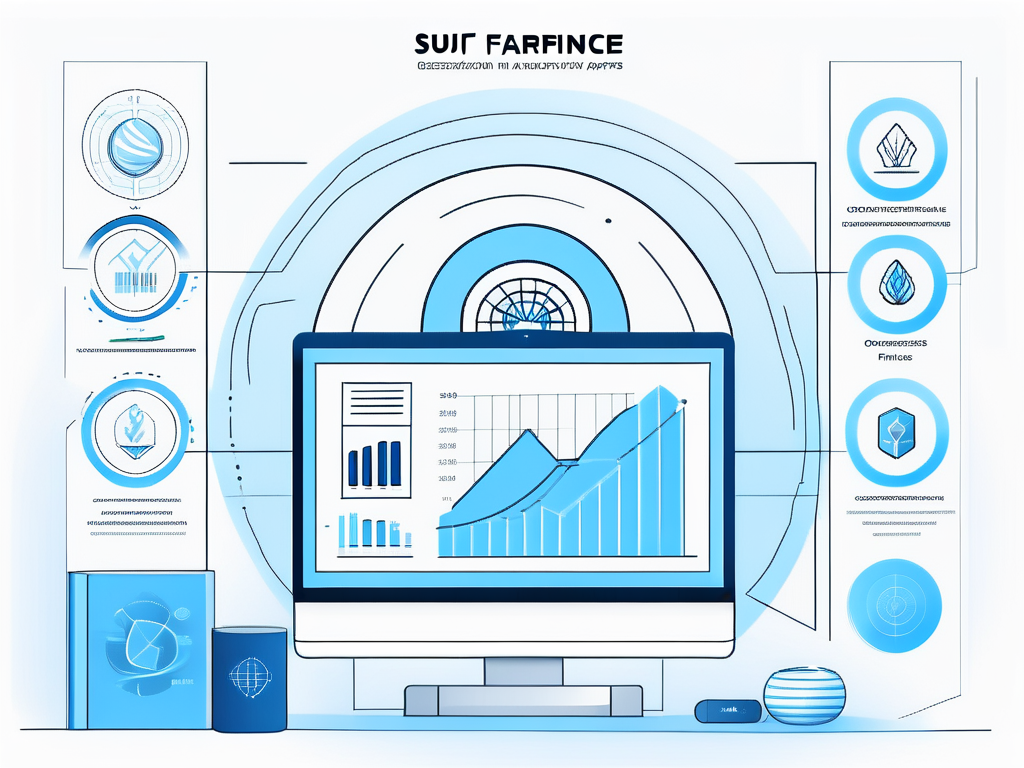This article delves into the potential applications and implications of SUI technology, particularly in the realm of decentralized finance (DeFi) and various other sectors. As the world rapidly evolves in the context of blockchain and financial innovation, understanding SUI's capabilities and future potential becomes increasingly vital.
Understanding SUI: A Brief Overview
To appreciate the specific applications of SUI, it’s important to first understand what it is and how it has developed over time. SUI represents an innovative approach to smart contracts and decentralized applications, designed to offer high efficiency, scalability, and ease of use.

What is SUI?
SUI is a next-generation blockchain technology that supports a unique execution environment tailored for complex decentralized applications. It uses a modular architecture which increases composability and allows developers to build on existing protocols without starting from scratch.
Unlike some other blockchain platforms, SUI enables immediate finality with transactions, which means that once a transaction is confirmed, it is final and cannot be reversed. This characteristic is particularly beneficial for financial services where trust and reliability are crucial.
Moreover, SUI’s design incorporates a user-friendly interface that simplifies the development process, making it accessible even for those new to blockchain technology. This focus on usability is essential in attracting a broader range of developers and businesses, fostering innovation and experimentation within the ecosystem. As a result, SUI is becoming a go-to platform for startups and established enterprises alike, looking to leverage the advantages of decentralized applications.
The Evolution of SUI
The development of SUI has occurred in stages, adapting to the growing needs of users and developers. Initially focused on delivering foundational functionalities, SUI has since expanded to include advanced features such as improved interoperability with other blockchain networks and enhanced developer tools.
Over the years, SUI has also witnessed extensive community involvement, with developers contributing to its growth through innovations and enhancements. This collaborative approach has not only enriched SUI’s capabilities but has also helped in establishing a vibrant ecosystem around it.
Furthermore, SUI has embraced the concept of decentralized governance, allowing stakeholders to participate in decision-making processes regarding protocol upgrades and feature implementations. This democratic approach ensures that the platform evolves in a way that reflects the needs and desires of its community, fostering a sense of ownership among users. As SUI continues to mature, it is likely to attract even more attention from developers and investors, solidifying its role as a key player in the blockchain landscape.
The Intersection of SUI and DeFi
The integration of SUI technology into the DeFi space is where its potential truly shines. As decentralized finance continues to reshape the financial landscape, SUI provides the necessary tools to enhance this transformation.
The Role of SUI in DeFi
SUI plays a pivotal role in improving the efficiency and security of DeFi platforms. By enabling faster transactions and lower fees, SUI enhances user experience and encourages more users to participate in DeFi ecosystems.
Additionally, its modular approach allows DeFi projects to evolve more rapidly. Developers can leverage existing SUI modules to build novel financial products, ranging from decentralized lending protocols to yield farming aggregators, without the burden of starting from the ground up. This flexibility not only accelerates innovation but also fosters a collaborative environment where developers can share insights and improvements, ultimately leading to a more robust DeFi landscape.
Potential Benefits and Challenges
While the SUI framework offers numerous advantages, it also faces challenges that need to be addressed. The benefits include:
- Scalability: SUI's architecture allows for high throughput and quick settlement times, crucial for high-volume DeFi applications.
- Interoperability: It promotes integration with various blockchain networks, increasing the flexibility of DeFi projects.
- User Experience: SUI's intuitive design leads to better user engagement and facilitates onboarding for new users in the financial space.
On the flip side, challenges such as regulatory concerns and the need for widespread adoption remain significant hurdles. SUI must navigate the evolving landscape of laws and regulations governing cryptocurrencies and blockchain technologies to realize its full potential. Moreover, as the DeFi sector grows, the risk of smart contract vulnerabilities and exploits increases, necessitating robust security measures. Developers must prioritize security audits and implement best practices to safeguard user assets and maintain trust in the ecosystem.
Furthermore, the education of users about the intricacies of DeFi and SUI technology is paramount. Many potential users are still unfamiliar with the concepts of decentralized finance, which can hinder adoption. Initiatives that focus on user education, such as tutorials, webinars, and community engagement, can play a crucial role in demystifying these technologies and encouraging broader participation. By bridging the knowledge gap, SUI can empower a new generation of users to explore the benefits of DeFi, ultimately contributing to a more inclusive financial future.
SUI Use Cases in Different Industries
Beyond the DeFi space, SUI technology has promising applications across various industries, each benefiting from its unique characteristics. Below are some noteworthy examples.
SUI in Fintech
In the fintech industry, SUI can streamline payment processing, enabling real-time transactions at minimal costs. Fintech companies can utilize SUI to offer blockchain-based payment solutions, lending services, and innovative financial products that cater to both individuals and businesses.
Moreover, the transparency offered by SUI can enhance trust in fintech services, as clients can verify transactions and audit trails securely on the blockchain. This transparency also fosters a competitive environment where companies are incentivized to maintain high standards of service, knowing that their practices are open to scrutiny. Furthermore, SUI's scalability can accommodate a growing number of users, ensuring that financial services remain efficient and accessible even as demand increases.
SUI in Supply Chain Management
Supply chain management stands to gain significantly from the application of SUI technology. Its ability to provide transparent and immutable records can revolutionize the way goods are tracked and verified throughout the supply chain process.
With SUI, businesses can ensure product authenticity, mitigate fraud, and streamline operations. This visibility not only minimizes risk but also boosts consumer confidence in product integrity, especially in industries like pharmaceuticals and food safety. Additionally, SUI can facilitate real-time tracking of shipments, allowing businesses to respond swiftly to disruptions or delays. By integrating SUI with IoT devices, companies can automate inventory management and optimize logistics, ultimately reducing costs and improving delivery times.
SUI in Healthcare
If applied in healthcare, SUI can enhance patient data management, allowing for secure sharing of medical records among healthcare providers. This could lead to improved patient care coordination and better health outcomes as vital information is readily accessible to authorized entities.
Additionally, SUI could facilitate innovative solutions such as decentralized clinical trials, giving researchers access to a richer dataset from diverse populations while maintaining strict data privacy and security protocols. The ability to securely store and share anonymized patient data can also accelerate medical research and the development of new treatments. Furthermore, SUI technology can empower patients by giving them control over their own health data, allowing them to share it selectively with providers or researchers, thus fostering a more patient-centric approach to healthcare innovation.
Future Prospects of SUI in DeFi
The future of SUI in DeFi looks bright, with numerous emerging trends shaping its trajectory. As technology advances and user needs evolve, SUI is well-positioned to adapt and thrive in the DeFi landscape.

Emerging Trends in SUI and DeFi
One noticeable trend is the increasing focus on user-centric design, which enhances accessibility for users unfamiliar with complex blockchain technologies. SUI’s dedication to creating a seamless experience is likely to attract a broader audience to DeFi platforms. This shift towards user-friendly interfaces not only lowers the barrier to entry for novice users but also encourages seasoned investors to explore new opportunities within the ecosystem. As educational resources proliferate, users will find themselves better equipped to navigate the intricacies of DeFi, fostering a more inclusive environment.
Furthermore, the rise of decentralized autonomous organizations (DAOs) could foster a new wave of community-driven projects on SUI, allowing decentralized governance structures to gain prominence and reshape how decisions are made within DeFi ecosystems. These DAOs empower users to take an active role in the development and management of projects, creating a sense of ownership and responsibility. As a result, we may witness a surge in innovative proposals and initiatives that reflect the collective interests of the community, driving engagement and participation to unprecedented levels.
Predictions for SUI's Impact on DeFi
Looking ahead, predictions suggest that SUI could redefine the standards of efficiency and productivity in DeFi. As more industries adopt SUI, the collective innovation will likely introduce novel financial instruments and applications that we have yet to envision. The integration of artificial intelligence and machine learning into SUI protocols could further enhance decision-making processes, allowing for real-time data analysis and risk assessment that are crucial for informed trading and investment strategies.
Moreover, as regulatory frameworks around DeFi continue to evolve, SUI's adaptability may position it as a trusted platform that can navigate compliance challenges while maintaining its decentralized ethos. This balance between innovation and regulation is essential for the long-term sustainability of DeFi projects. Ultimately, SUI is set to play an influential role in the next generation of DeFi, reinforcing its position as a cornerstone technology for a decentralized future. As the ecosystem matures, the collaborative efforts between developers, users, and regulators will shape a more robust and resilient DeFi landscape, unlocking unprecedented opportunities for financial inclusion and empowerment.
Conclusion: The Expanding Horizons of SUI in DeFi and Beyond
In conclusion, SUI presents an array of possibilities that extend beyond the traditional bounds of DeFi. By providing a robust and flexible infrastructure, SUI is paving the way for innovations across multiple sectors, including fintech, supply chain, and healthcare.

As this technology continues to evolve, its integration into various industries will likely lead to enhanced efficiencies, improved transparency, and greater user engagement. The horizon for SUI is expanding rapidly, and the potential impact it can have in reshaping our digital economy is immense.
.svg)


